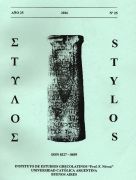Por favor, use este identificador para citar o enlazar este ítem:
https://repositorio.uca.edu.ar/handle/123456789/4680| Campo DC | Valor | Lengua/Idioma |
|---|---|---|
| dc.contributor.author | Erro, María Guadalupe | es |
| dc.date.accessioned | 2019-06-01T18:46:57Z | - |
| dc.date.available | 2019-06-01T18:46:57Z | - |
| dc.date.issued | 2016 | - |
| dc.identifier.citation | Erro, María G. “Usos del aoristo y problemas de interpretación” [en línea]. Stylos, 25 (2016). Disponible en: https://repositorio.uca.edu.ar/handle/123456789/4680 | es |
| dc.identifier.issn | 0327-8859 | - |
| dc.identifier.uri | https://repositorio.uca.edu.ar/handle/123456789/4680 | - |
| dc.description.abstract | Resumen: Hay un valioso recurso expresivo en la selección e interrelación de las formas verbales, en los datos que aportan para la comprensión y la traducción; pero no siempre les prestamos suficiente atención. En el plexo de los tiempos que conforman el sistema verbal griego, por ejemplo, numerosos empleos del aoristo parecieran entrar en conflicto con el valor fundamental que se le atribuye al tema. ¿Cómo se explica un supuesto pretérito usado para referir verdades generales o eventos que no necesariamente pertenecen al pasado? ¿Cuál es el factor determinante de estos usos conocidos como “gnómicos”? ¿Qué consecuencias puede tener todo esto a la hora de leer, analizar, interpretar y traducir? | es |
| dc.description.abstract | Abstract: There is a valuable expressive device in the selection and interrelation of the verbal forms, in the information that provides for the comprehension and the translation; but we not always pay enough attention to them. In the plexus of times that shape the Greek verbal system, for example, many uses of the aorist seemed to come into conflict with the fundamental value that it is attributed to the stem. How is an assumed past explained used to refer general truths or events that not necessary belong to the past? What is the determinant of these uses known as “gnomic”? What consequences can all this have at the moment of reading, analyzing, interpreting and translating? | es |
| dc.format | application/pdf | es |
| dc.language.iso | spa | es |
| dc.publisher | Universidad Católica Argentina. Facultad de Filosofía y Letras. Instituto de estudios grecolatinos "Prof. F. Nóvoa" | es |
| dc.rights | Acceso Abierto | es |
| dc.rights.uri | https://creativecommons.org/licenses/by-nc-sa/4.0/ | es |
| dc.source | Stylos Nº 25, 2016 | es |
| dc.subject | TRADUCCION | es |
| dc.subject | INTERPRETACION | es |
| dc.subject | GRIEGO | es |
| dc.subject | VERBOS | es |
| dc.subject | GRAMATICA | es |
| dc.subject | TIEMPOS VERBALES | es |
| dc.title | Usos del aoristo y problemas de interpretación | es |
| dc.type | Artículo | es |
| uca.path | Stylos|2016 nº 25 | es |
| uca.disciplina | LENGUA | es |
| uca.filename | /home/data-uca-generic/folder_generic/stylos/stylos25/usos-aoristo-problemas-interpretacion/metadata.xml | es |
| uca.issnrd | 1 | es |
| uca.affiliation | Fil: Erro, María Guadalupe. Universidad Nacional de Córdoba; Argentina | es |
| uca.orden | 07 | es |
| uca.version | publishedVersion | es |
| item.fulltext | With Fulltext | - |
| item.grantfulltext | open | - |
| item.languageiso639-1 | es | - |
| Aparece en las colecciones: | STY - 2016 nro. 25 | |
Ficheros en este ítem:
| Fichero | Descripción | Tamaño | Formato | |
|---|---|---|---|---|
| usos-aoristo-problemas-interpretacion.pdf | 385,19 kB | Adobe PDF |  Visualizar/Abrir |
Visualizaciones de página(s)
115
comprobado en 30-abr-2024
Descarga(s)
645
comprobado en 30-abr-2024
Google ScholarTM
Ver en Google Scholar
Este ítem está sujeto a una Licencia Creative Commons

